You’ve might’ve read about beautiful Japanese phrases.
And you might know about unique Japanese words.
But… what about funny Japanese phrases? Do they exist?
Sure!
Phrases like “lonely mouth,” “people that yammer loudly about their opinions,” “to sweat oil,” and much more.
So today, you’ll learn 35+ quirky and funny Japanese phrases. Good? Good.
Here are the phrases.
1) お腹がペコペコ
- Meaning: I am hungry
- Pronunciation: Onaka ga peko peko
This is a funny Japanese phrase that indicates that you’re hungry.
The phrase peko peko doesn’t really have a meaning and it is similar to a sound effect — an onomatopoeia.
So, next time you’re at a restaurant and you can’t wait to eat, be sure to tell everyone that your “onaka” is “peko peko.”
By the way, this is probably one of the most common funny Japanese phrases here. You’ll hear this a lot in real life.
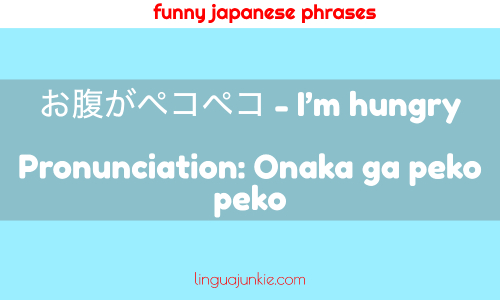
2) 鼻水 – Snot
- Meaning: Snot
- Literal Meaning: Nose Water
- Pronunciation: Hana mizu
- Hana: Nose
- Mizu: Water
If you already know some Japanese, then you’ll know that hana is nose and mizu is water.
So then, what is nose water? You got it, snot!
3) バーコード人
- Meaning: Guy with awful combover (barcode hair guy)
- Pronunciation: ba-ko-do jin
First, バーコードmeans barcode.
Now, imagine someone with a “barcode” on their head.
Like, thin strands of hair attempting to cover up the audacious baldness that’s clearly very much there. Yep, that’s a barcode guy.
4) バックシャン
- Meaning: A woman who is beautiful from behind
- Pronunciation: bakkushan
This funny Japanese word is a combination of 2 words.
First, the English word “back.”
Second, the German word, “schön,” which means beautiful. So, beautiful from the back, get it!?
5) 鼻くそ – Booger
- Pronunciation: Hanakuso
You’ve heard of hanamizu up top and know that hana means nose.
And what about kuso?
Well, it’s a bad Japanese word.
A stronger version of “Poop.”
So, naturally, you could figure it out that a booger is nose poop.
6) 赤の他人 – Complete stranger (red stranger)
- Pronunciation: Aka no tanin
“Aka no tanin” is a funny Japanese phrase because of its use of “aka,” meaning “red”.
For some reason, a “red stranger” means a “complete stranger” in Japanese.
This phrase is especially useful when you want to strongly express that the other person has no connection to you at all.
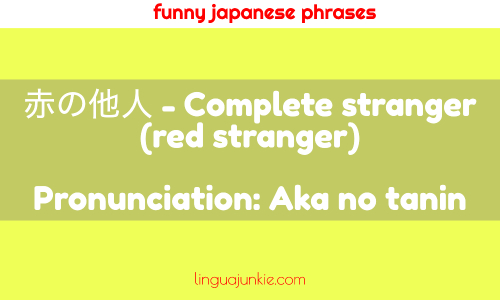
7) 油を売る – Being lazy/taking your time (to sell oil)
- Pronunciation: Abura o uru
This is a traditional phrase that is funny because the direct translation is “selling oil”.
Back in the day, those who sold oil worked extremely short hours. This is why people started using it to mean someone who is slacking off and being lazy.
Try out this phrase for fun next time your friend is being lazy and not doing what they are supposed to be doing.
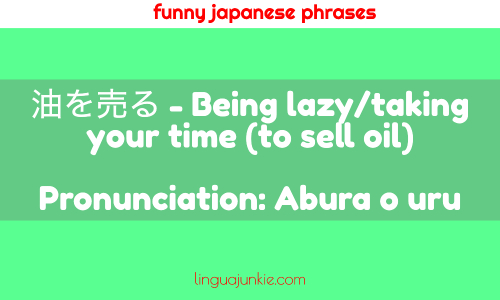
8) うんともすんとも – No response (getting ghosted)
- Pronunciation: Un tomo sun tomo
A funny-sounding phrase, “un tomo sun tomo” is used when you don’t hear anything back from someone you contacted.
“Un” in Japanese means “yes” or “ok”. If you’ve been ghosted, this would be the perfect phrase to use.
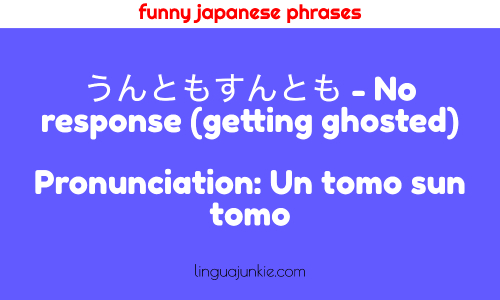
9) ちんぷんかんぷん – Makes no sense
- Pronunciation: Chin pun kan pun
Another funny-sounding phrase, chin pun kan pun describes the sound you might have in your head when something doesn’t make sense to you.
This could be used if you’re sitting in a particularly difficult math class.
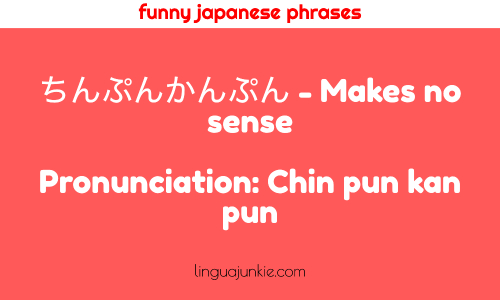
10) ろくでなし – Good for nothing/useless
- Pronunciation: Roku de nashi
This is a phrase that’s used to describe someone who is “good for nothing” or “useless”.
It can be a bit funny because the phrase sounds like “roku,” meaning “six”, combined with “nashi,” meaning “nothing”.
You might hear people use this phrase towards those who aren’t taking responsibility, or doing anything meaningful in their life.
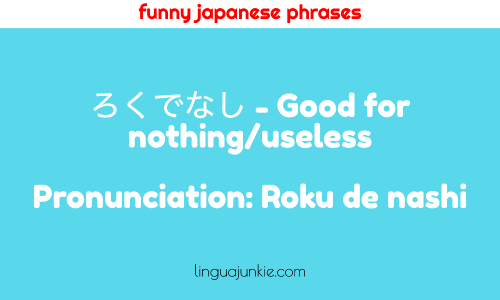
11) 口寂しい – Craving for something (lonely mouth)
- Pronunciation: Kuchi sabishii
This is a funny expression in Japanese that literally translates to “lonely mouth.”
When your mouth feels “lonely,” it means you want to snack on something even if you’re not hungry.
It describes the feeling when you’re in front of the T.V. and want to munch on something.
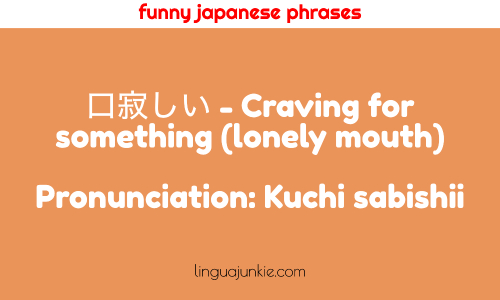
12) モヤモヤする – Feeling confused
- Pronunciation: Moya moya suru
“Moya moya” is a funny phrase that describes when your mind is cloudy.
It can be used when you’re indecisive or can’t commit to something.
Charm your Japanese friends by saying this phrase next time you’re unsure or confused.
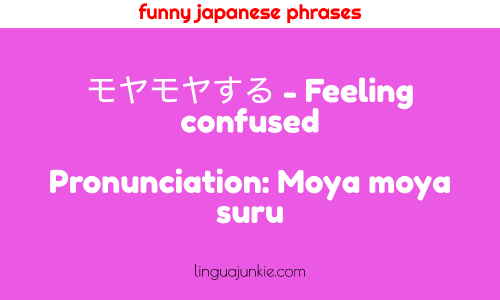
13) めんどくさい
- Meaning: troublesome/annoying
- Pronunciation: Mendo kusai
Japanese people say this phrase frequently when something is troublesome or can’t be bothered.
It’s a funny phrase that doesn’t quite translate to English, and it is useful when you want to complain about something.
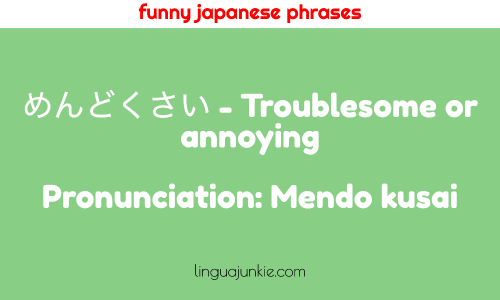
14) 侃侃諤諤
- Meaning: People expressing their opinions strongly & talking about it
- Pronunciation: Kan kan gaku gaku
“Kan kan gaku gaku” is a funny phrase that describes how people who are debating with each other would sound like.
If you say “Kan kan gaku gaku” out loud you’ll notice that the hard consonants, right?
It sounds like a whole lot of noise, like people expressing their opinions loudly.
This is one of my favorite funny Japanese phrases.
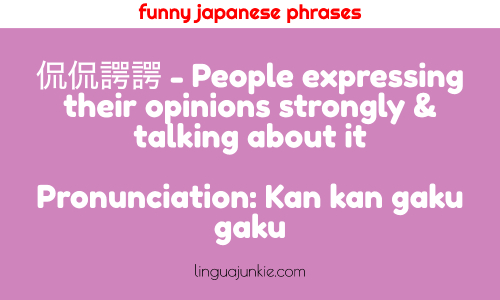
15) 変態百出
- Meaning: Changing one’s looks constantly
- Pronunciation: Hen tai hyaku shutsu
“Hentai hyaku shutsu” is a phrase that describes someone who looks different every time you see them.
It can be used towards a woman who likes to change her fashion and makeup constantly.
The rough translation of the phrase is “changing figure one hundred times”.
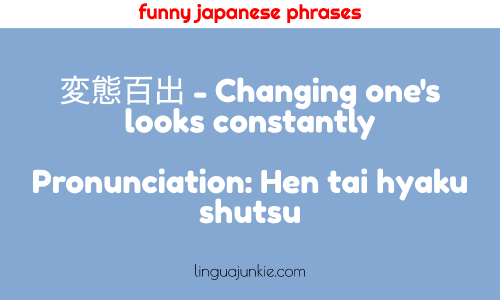
16) 道がジグザグ
- Meaning: Road is zigzag
- Pronunciation: Michi ga jigu zagu
This is a phrase that’s fun to say.
It uses the word “zig zag” in English, pronounced in a Japanese style.
Winding roads or roads that go back and forth can be described with this phrase.
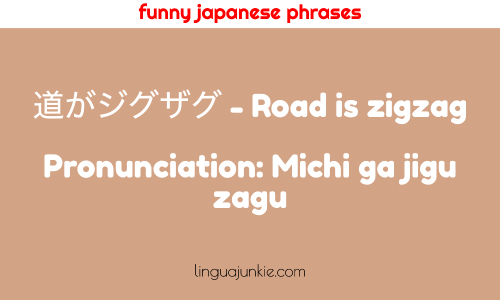
17) のんびりする
- Meaning: To relax
- Pronunciation: Nonbiri suru
“Nonbiri suru” is a phrase that describes how you stretch out your body when you relax. It’s the perfect phrase for when you’re stretched out on the beach or in your favorite hot springs.
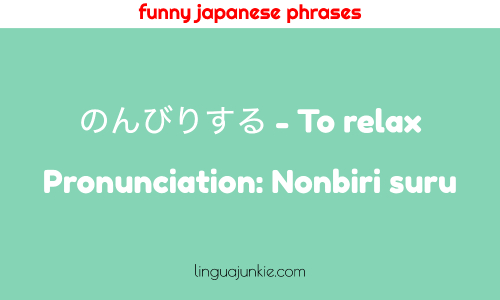
18) 猫の手でも借りたい
- Meaning: Desperate for help
- Literal Meaning: Could even use the help of a cat’s paw
- Pronunciation: Neko no te de mo karitai
This is a funny Japanese phrase that describes when you’re desperate for help.
It means that when you really need help, even a cat’s paw could be useful.
In reality, a cat’s paw can’t do much, so it’s a funny way to describe the situation.
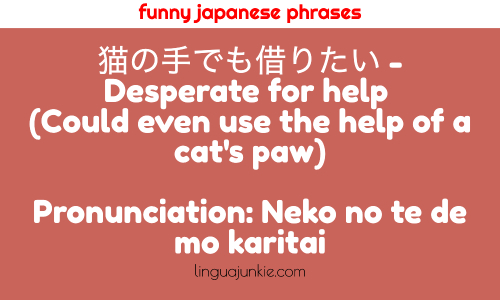
19) 猫ばば
- Meaning: Doing something bad and hiding it
- Pronunciation: Neko baba
“Neko baba” is another phrase that involves a cat.
This phrase refers to when someone does something bad and hides it.
It comes from how cats throw dirt or sand on top of their poop. It’s usually used in a light-hearted way.
For example, you can use it when your friend nonchalantly steals some snacks from you.
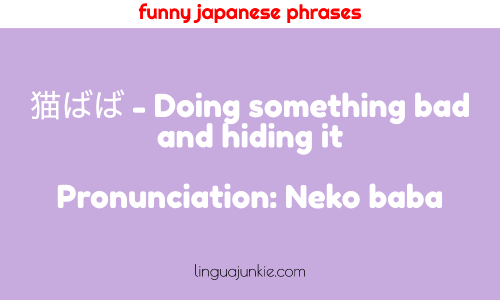
20) 頭が真っ白
- Meaning: Head is blank
- Pronunciation: Atama ga masshiro
When you suddenly forget what you are saying, you can use this Japanese phrase.
It means that your head goes “white” or “blank”. In a literal translation, it would be “my head is white”.

21) 脂汗を描く
- Meaning: Strong and thick sweat
- Literal meaning: to sweat oil
- Pronunciation: Abura ase o kaku
- Abura: oil
- Ase: sweat
- Ase wo kaku: to sweat
Can you imagine someone sweating oil? Ew, right?
Well, this funny Japanese phrase uses a metaphor with oil to compare sweat.
It describes the moment when you’re so nervous that you start to develop thick sweat.
Thick. Greasy. Viscous. Dark yellow. Foul-smelling. Like… oil!
So, if you’re someone who sweats with nervousness, this is the perfect phrase.
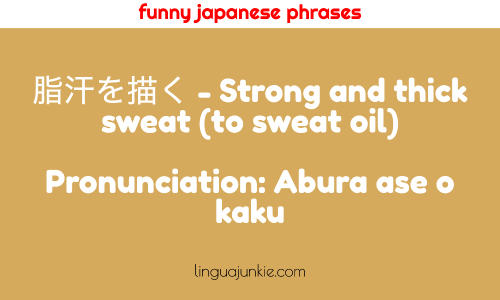
22) パラサイトシングル
- Meaning: Parasite bachelor
- Pronunciation: Parasaito shinguru
Obviously, this was taken from English as it pretty much reads “parasite single.”
It’s an adult who lives with their parents and mooches off of them even though they can easily live on their own.
23) 積ん読
- Meaning: Buying/Piling Up Books without Reading
- Pronunciation: Tsundoku
Ever bought books and piled them up without actually reading them?
And now, you have a growing pile that you’ll get to “one day?”
Well, there’s a word for your addiction and problem. It’s called “tsundoku.”
Tsundoku is a combination of the verb 積む (tsumu – to pile up), and 読 (doku – reading.)
24) 別腹
- Meaning: Separate Stomach
- Pronunciation: Betsubara
Betsu means separate and bara means stomach.
But what does it mean? Betsubara means… after a big dinner, when it’s time for dessert, suddenly you have space, as if you grew another stomach.
25) 三日坊主
- Meaning: Someone who gives up easily
- Literal Meaning: 3 Day Monk.
- Pronunciation: mikka bouzu
What’s a 3 Day Monk? Well, it’s someone that wanted to be a monk, tried for 3 days, and gave up.
Or, someone that tried learning Japanese… and then gave up.
Or… someone that wanted to be this awesome, super talented person that at the end of the day, couldn’t leave their couch.
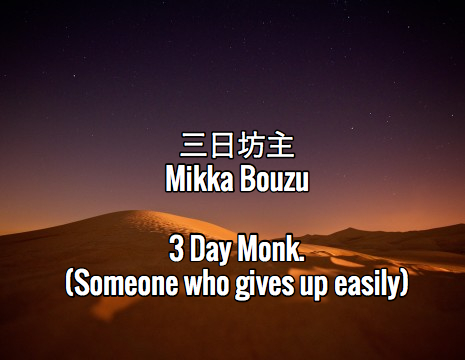
26) 猿も木から落ちる。
- Saru mo ki kara ochiru
- Even monkeys fall off of trees (Meaning: Even experts make mistakes)
This is a funny thing to say in Japanese when you want to say that anyone can make mistakes!
Try using it next time your Japanese friend makes a mistake to reassure them about it.
27) 花より団子
- Hana yori dango
- Rice dumplings over flowers (meaning: practicality over aesthetics)
Hana yori dango refers to the idea that being practical is more important than how things look.
This is a good reminder to purchase things for their use rather than what image they can bring.
It’s a funny phrase to say if you are in a situation where you’re trying to buy something and you have two choices where one is practical and one looks nice.
28) 猫の手も借りたい
- Neko no te mo kari tai
- I could even borrow a cat’s paw (meaning: So busy that I need help)
In reality, a cat’s paw couldn’t help you too much.
This funny phrase is trying to describe how even useless help would be useful because you’re so busy and overwhelmed.
29) 目が高い
- Me ga takai
- High eyes (meaning: expensive taste)
This is a funny Japanese phrase to say if you want to describe someone who always has an expensive taste.
They might like to eat at high-end restaurants and shop for the latest brands.
30) 豚に真珠
- Buta ni shinju
- Pearls for a pig (meaning: don’t give something high value to someone who won’t appreciate it)
This phrase is perfect for when you want to describe a situation where you gift someone an expensive item and they can’t appreciate it.
For example, if you give a box of high-end chocolates to someone who prefers to eat candy bars from the convenience store, they may not appreciate the high value and refined taste of a fancy chocolatier.
31) 蛙の子は蛙
- Kaeru no ko wa kaeru
- A frog’s child is a frog (meaning: children follow the path of their parents)
If you want to describe a situation where a child seems like they might not be like their parents you could try saying this funny Japanese phrase.
The reason it uses a frog as an example is because a tadpole looks nothing like a frog but it grows up to become a frog.
Even if a child is nothing like their parents they will eventually grow up to become similar.
32) 雀の涙
- Suzume no namida
- A sparrow’s tear (meaning: something small)
This would be a funny thing to say in Japanese if you received something that was not sufficient.
For example, if you were at the restaurant and the portion was small, you could say it was like a sparrow’s tear.
It generally has a negative connotation such as small amounts of money and food.
33) 犬の遠吠え
- Inu no tou boe
- A dog’s howl (meaning: cowardly)
A dog will often bark from far away in a very confident way without knowing who is coming.
This funny phrase describes a situation where someone makes a loud fuss or talks big when they are not competent or they are weak.
34) 猫舌
- Neko jita
- Cat tongue (meaning: easy to burn mouth)
If you’re sipping a hot drink, this funny word will come in handy in Japanese.
It means that you tend to be sensitive to hot and can burn your mouth easily.
It comes from the idea that cats cannot drink liquids that are too hot.
You could lighten up the mood of a conversation by mentioning this word when you’re eating a hot soup!
35) ペラペラ
- Pera pera
- Fluent
This is a funny word that you’ll often hear concerning language skills.
If you are pera pera in Japanese it means that you are fluent.
This word comes from the onomatopoeia of someone talking fast.
36) 喉から手が出る
- Nodo kara te ga deru
- Hand comes out of my throat (meaning: wanting badly)
This a funny way to say that you want something very badly.
If you’ve been hiking on the mountain and forgot your water, you might be able to say this phrase.
It could also be something you’ve been wanting to buy that is out of reach.
The imagery of your hand coming out of the throat can be comical.
37) 歯が立たない
- Ha ga tatanai
- Teeth don’t scratch it (meaning: There’s no chance)
Ha ga tatanai refers to when you’re trying to bite something but you’re not able to bite it.
It could be a situation when you’re against a strong opponent in a game and are unable to beat them because you’re too weak.
This could be useful if you’re playing board games or if you feel like you’re not competent at something.
39) 親父ギャグ
- Oyaji gyagu
- Father or older man joke (meaning: Dad Joke)
This is a funny phrase because it is the translation of a “dad joke” in English!
If you hear a stupid pun in Japanese you could say that it is an oyaji gyagu.
For example, panda wa pan da would be an oyaji gyagu because it is a word play on the word panda and pan which is bread in Japanese.
Funny Japanese Phrases Conclusion
Japanese has no shortage of funny Japanese words and phrases.
And now, you know some funny Japanese phrases that you can whip out and impress native speakers with.
If you have a favorite Japanese phrase that’s not on the poll, leave a comment.
Of course, if you have any other suggestions, leave a comment as well!
I read ’em all.
– The Main Lingua Junkie
P.S. Hey thanks for swiping my content Thea.
